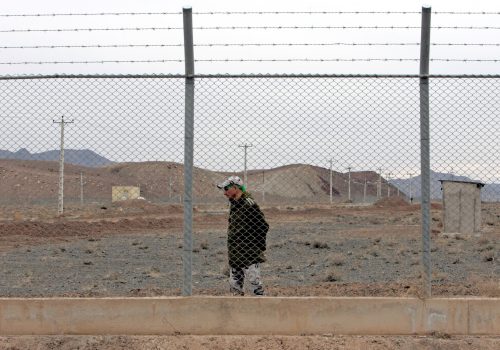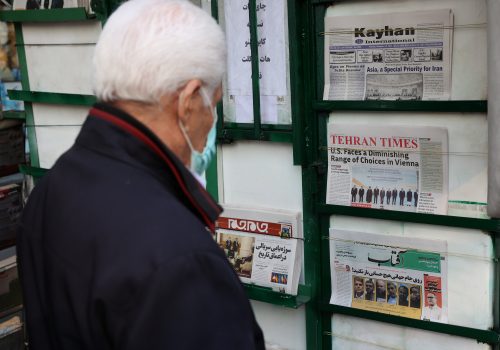There’s talk of a military option against Iran. Here’s why it’s unlikely.
With negotiations proceeding slowly in Vienna over reviving the 2015 nuclear deal, talk of a “military option” against Iran has again arisen. Over the past decade, as the nuclear crisis between Iran and the West has waxed and waned, military strikes on Iran’s nuclear facilities by Israel and/or the United States have repeatedly been suggested.
The withdrawal of the Donald Trump administration from the Joint Comprehensive Plan of Action (JCPOA) in 2018 and the re-imposition of harsh US sanctions on Tehran prompted the leaders of the Islamic Republic to expand their nuclear capabilities. While Iranian officials have belatedly returned to talks in Vienna, Iran has progressed so far in its nuclear program that some advances, particularly in nuclear knowledge, are irreversible.
Could Iran’s program be contained by a military attack? And what would be the consequences in terms of collateral damage and regional instability?
Since the September 11, 2001 terrorist attacks on the United States, which greatly increased US military presence in the Middle East, and the launching of a so-called Global War on Terrorism, the possibility of war with Iran has been a topic of discussion. So far, this has not occurred for a number of reasons, including strategic prioritization of Afghanistan and Iraq by Washington. Had the US or Israel attacked Iran two decades ago, they would have faced a country with inefficient armed forces equipped with worn-out, aged military hardware.
But, Iran, despite being the target of numerous sanctions and embargos, has managed to improve its combat capabilities, learning from and sometimes copying technologies from the US military in Iraq and Afghanistan. Iran simultaneously used several effective strategies to increase its deterrent capabilities, including increasing the budget for research and development of defense industries and armed forces (especially for the Islamic Revolutionary Guards Corps (IRGC); changing the essence of its military doctrine to stress asymmetric and low-cost tactics; developing and dispersing its nuclear facilities; establishing and strengthening allied paramilitary groups in Lebanon, Iraq, Afghanistan, Yemen, Syria, and the Gaza Strip; and stopping short of reaching an irreversible level of nuclear power.
Using these strategies and benefiting from the mistakes of its adversaries, Iran has become a key player in the Middle East, repeatedly challenging the interests of the US, Israel, and Iran’s Arab rivals. This increase in power reached a point where Iranian armed forces confronted US forces directly. The shooting down of a Global Hawk Espionage UAV on June 20, 2019 and ballistic missiles launches at the Ayn Al Asad air base in Iraq on January 8, 2020 (in retaliation for the US assassination of Quds Force commander General Qasem Soleimani near Baghdad airport) are both examples.
A change in US administrations a year ago brought hope that US-Iran diplomacy could pick up from where it left off in 2016. However, Iran and the US, while making progress, failed to restore the JCPOA before the Iranian presidential election in June 2020. With Ebrahim Raisi taking office in August 2021, the new Iranian diplomatic team has scrapped the prior team’s principles of goodwill, trust-building, and optimism, which lead to an atmosphere of compromise and understanding. Along with this shift in negotiating approach, the Iranian armed forces demonstrated new weaponry and combat capabilities during a large-scale military drill called the Great Prophet 17, which was conducted in the country’s central desert.
The exercises showed a considerable increase in speed and combat power of fast attack-boats, more accurate short-range and medium-range ballistic missiles that succeeded in hitting more targets, modernized armored vehicles such as the Karrar modern battle tank, improved electronic warfare capacities, and widespread and effective use of suicide drones against small targets. In addition, the IRGC hit a life-sized model of Israel’s Dimona nuclear facility in the heart of Iran’s central desert with several long-range and short-range ballistic missiles, as well as suicide drones.
Major General Gholam-Ali Rashid, commander of the Khatam al-Anbia’s armed forces central headquarters, said in an interview on December 20, 2021 that, if Iran were attacked, “the armed forces of the Islamic Republic will immediately attack all the centers, bases, routes, and spaces used for the passage and origin of the attack in unity with trained operational plans.”
Israel, which has always maintained it has a right to act preemptively against Iran, has toned down its rhetoric in recent days. Israeli Prime Minister Naftali Bennett declared on December 28, 2021, shortly after the IRGC exercises ended, that “Israel is not opposed to any agreement. A good deal is good.”
US military officials have acknowledged Iran’s growing military prowess, particularly in the area of ballistic missiles. “Iran’s missiles have become a more immediate threat than its nuclear program,” General Kenneth McKenzie, the commander of US Central Command, told The New Yorker. “Now they [Iran] can strike effectively across the breadth and depth of the Middle East. They could strike with accuracy, and they could strike with volume.”
Other factors make a war with Iran unappealing. The Joe Biden administration is more focused now on the fragile security situation in Eastern Europe due to the large Russian military deployment on the Ukrainian border, as well as China’s threats to Taiwan. The US has completely withdrawn from Afghanistan and reduced and changed the missions of its small force in Iraq. The proximate stabilization of the crisis in Syria also mitigates against Israel’s motivation to wage even a limited conflict with Iran. Even if the Vienna talks fail and tensions remain high, a military conflict is unlikely, as it would result in a lose-lose situation for all parties.
Abbas Qaidari is a researcher on international security and defense policy. Twitter: @AbbasQaidari.
Further reading
Mon, Dec 20, 2021
I once headed the Iran branch of Israel’s military intelligence research. Here’s why Israel can’t take out Iran’s nuclear program.
IranSource By
Besides the operational challenges in executing such a military attack, especially given Iranian forces’ buildup of surface-to-air units, there are other more strategic challenges facing Israel.
Tue, Dec 14, 2021
What happens if Iran nuclear talks collapse?
IranSource By Masoud Mostajabi
On December 9, the Atlantic Council’s Future of Iran Initiative (FOII) held a virtual public event on whether a ‘Plan B’ exists in the event the nuclear talks fail.
Wed, Dec 8, 2021
China is the real barometer of the state of Iran nuclear talks in Vienna
IranSource By
China, which played an important if secondary role during the final leg of nuclear negotiations during 2013-2015, is the most suited of the P4+1—Britain, China, France, Germany, and Russia—to exert effective leverage to bring Tehran back to compliance now.
Image: A number of new generation Iranian centrifuges are seen on display during Iran's National Nuclear Energy Day in Tehran, Iran April 10, 2021. Iranian Presidency Office/WANA (West Asia News Agency)/Handout via REUTERS


